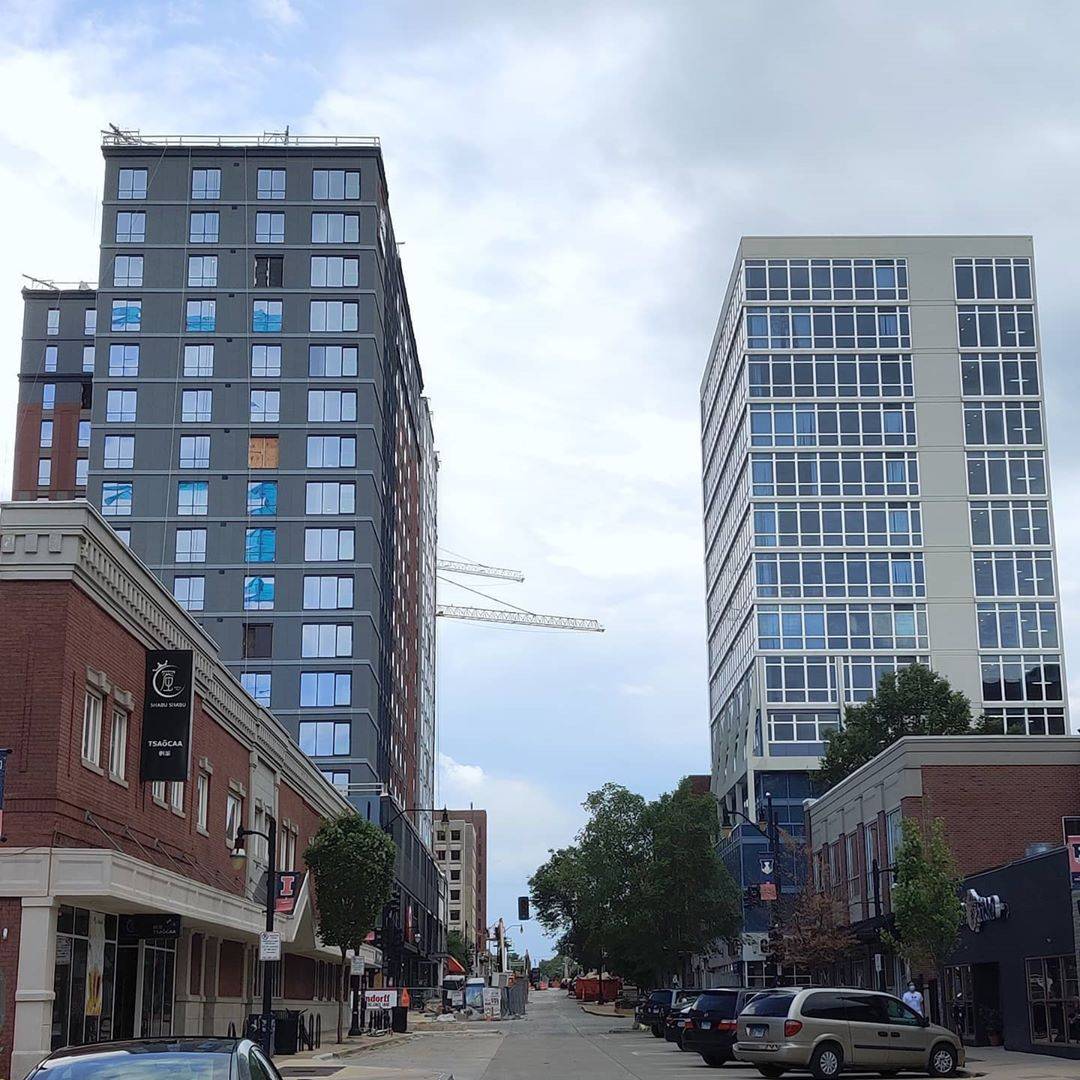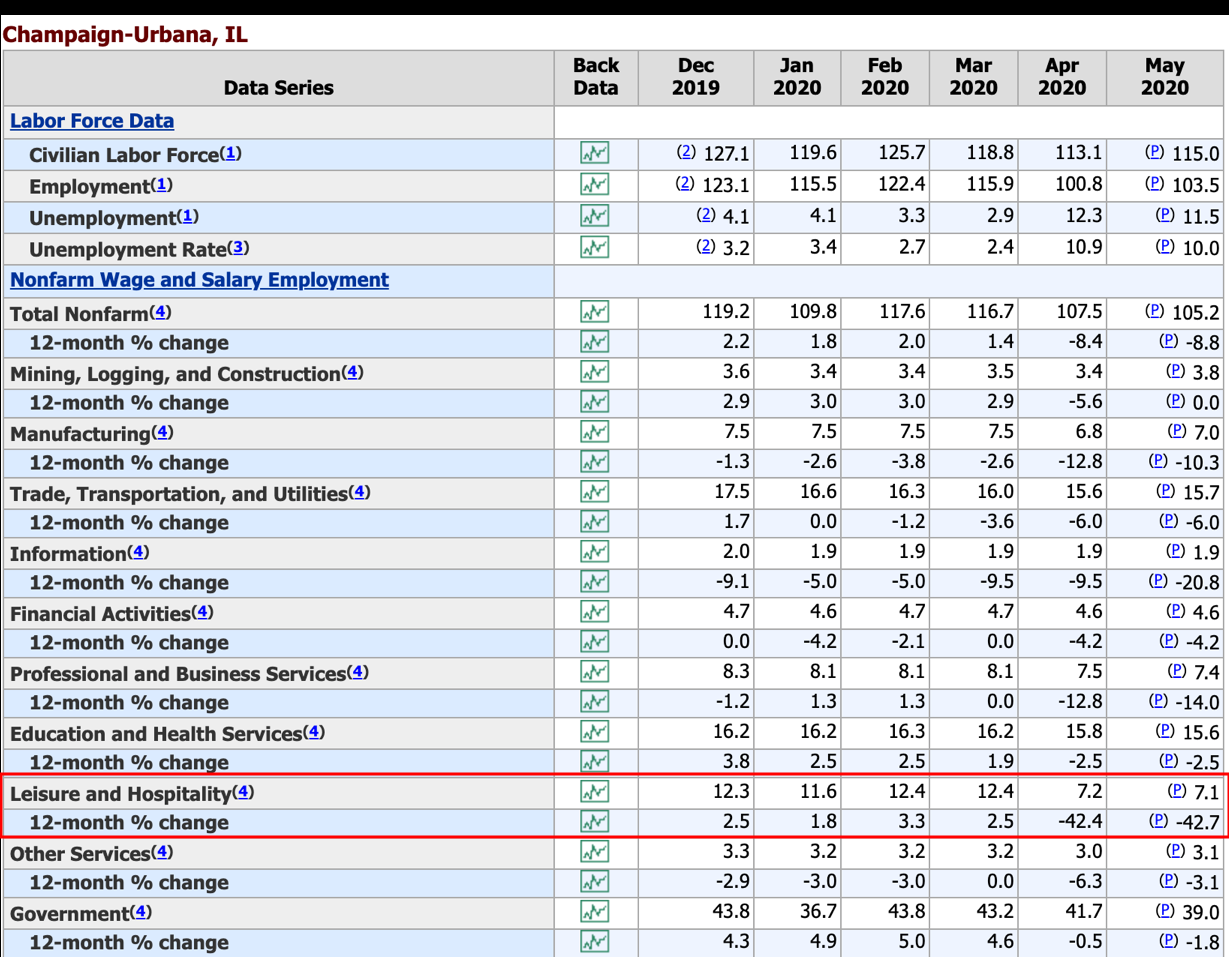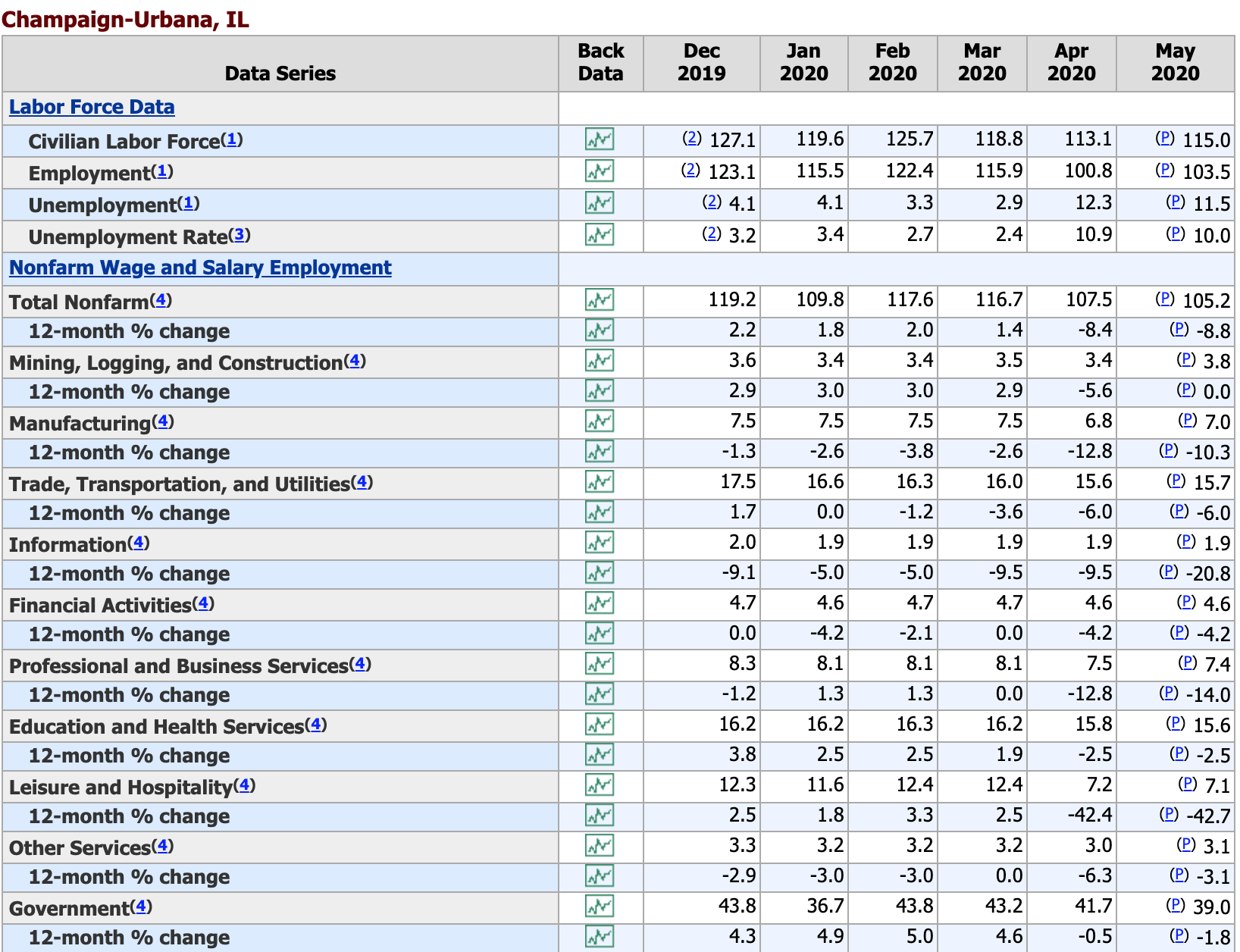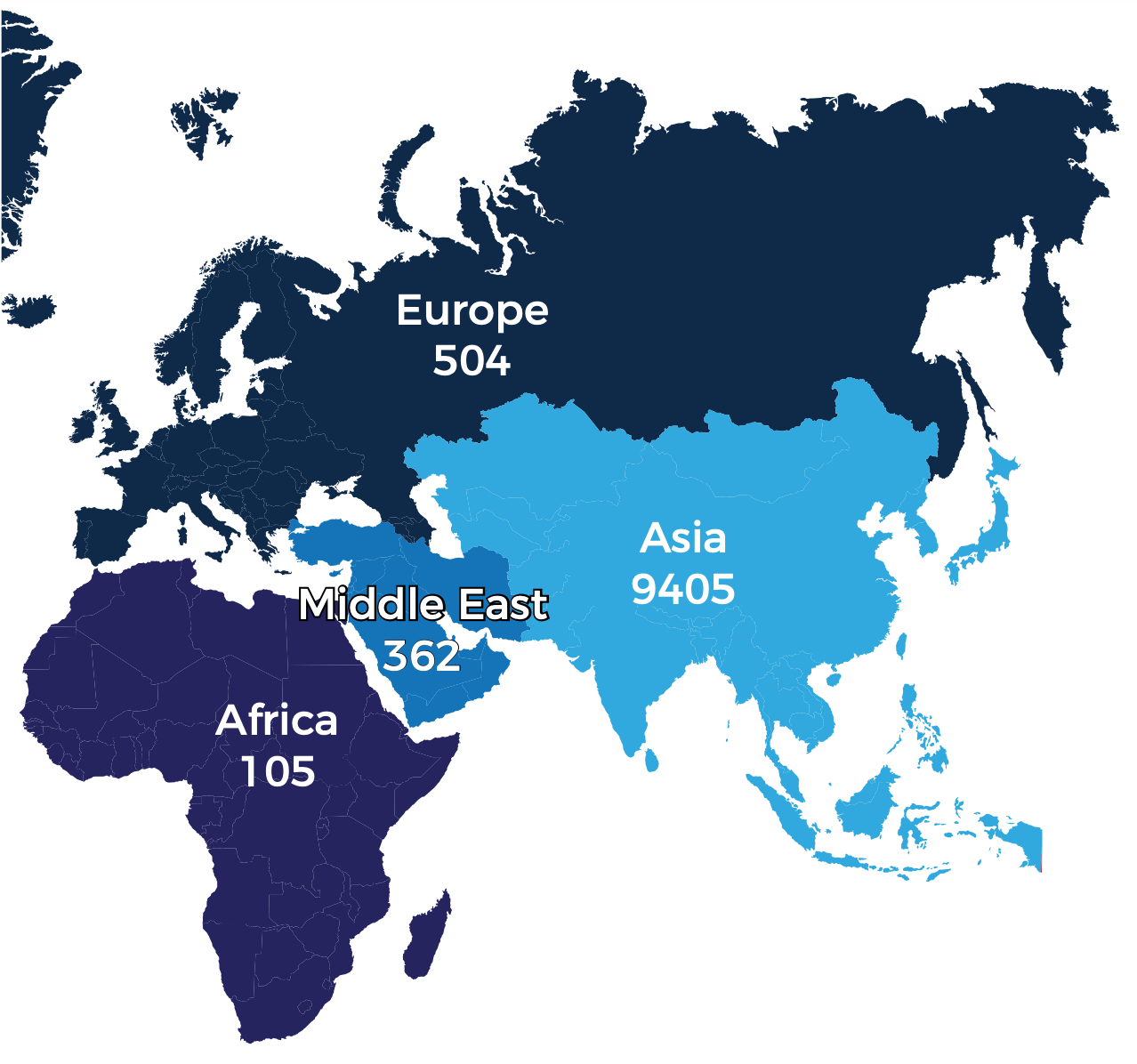Many students are fiercely subletting their 2021 academic-year leases right now, a phenomenon showcasing the low confidence in returning to the campus for the Fall, and even the Spring semester.
In a local online forum uiucthewall, packed mostly by the international students of U of I, there is a trend to ferociously undercut the original rent of apartments signed before the pandemic. A one bedroom apartment of The Dean Campustown (the brand-new Target’s building on Green) originally priced for $1299. Now, it is looking for someone to sublet with only $900 per month, about 1/3 price cut.

The DEAN Campustown is about to fully complete its long-waited construction in a month. Photo by Zink Zhang.
It is saying they are not coming back for now.
The international students’ decision should be seen as a warning sign to the campus business and even the community as a whole. It’s going to be a tough Fall at the very least. Some campus businesses have already made a decision during the summer — to fall back and leave.

Opened in 2019, PvP Bakery permanently closed in July, 2020. Photo by Zink Zhang.

Blink Mobile has been on campus since 2007. It made a decision to exit this summer. Photo by Zink Zhang.
PvP Bakery, an Asian bakery which opened last year, permanently closed in July. Blink Mobile, an electronic repair shop, permanently closed in June. Salad Meister, a salad shop, permanently closed in May after changing ownership.
Almost all campus businesses are experiencing one of the hardest times of the decade. An once-the-busiest Green Street restaurant, EVO Cafe, told me that the pandemic has cut their income “by 80%”. They are trying to survive by way of delivery platforms and loyal customers — and by working everyday all the way through the pandemic.

Photo by Zink Zhang.
In our conversation, I told him I was also concerned about the shrink of the economy and its impact to the businesses in Campustown. Not just now, but even after the academic year begins. Even with President Trump backing down after claims surrounding visas, many students have chosen not to come back to campus because of the visa rules and health risk. In addition, students who do come back would likely not risk themselves for dining out as often as they normally would.
It’s a certainty for the Fall, not knowing what it would become for the Spring. But the hardest time to pass is what we are experiencing now, with hopes of successfully making it to the Fall. This is the hope that I told to every friend who just “keeps himself/herself going” during this summer time. If you want to see the light of the tunnel, here it is: There are two good pieces of news that businesses should be highly aware of.

Leisure and Hospitality lost about 5,000 jobs, half of all job loss int he county because of COVID-19. Image is a screenshot from U.S. Bureaus of Labor Statistics.

In March 2020, Champaign County’s unemployment rate recorded all time low of 2.4%. Image is a screenshot from U.S. Bureaus of Labor Statistics.
First, it’s true, Champaign County’s economy was heavily hit by COVID-19. However, just before the month of outbreak, the unemployment rate was at an all time low of the decade: 2.4%. This, compared to the 8.5% in March 2010, showcases the economy was doing very well over this decade, and we have seen that with the expansion of both the university and Campustown. It’s true that the pandemic has wiped out several businesses, which could be the victims of the overheated economy growth of the last few years. But it would leave more room for the remaining businesses to come back after the pandemic. Those who survived would thrive in the new normal, if our economy would not suffer by a fundamental loss, that is, a (long-term) plummet of customers and their confidence in consuming.
Also, the economic data shows that the pandemic hit the hardest on the Leisure and Hospitality industry. In Champaign County, more than half of the job loss could be contributed to the hospitality industry. Although other industries have suffered the loss, it wasn’t that bad in a strict numerical sense: there were 10,000 job losses because of the pandemic, all industries except Leisure and Hospitality added up to 5,000. The most important case of the largest local economy contributor and the largest employer, the University of Illinois, did not suffer any significant job losses. Remember, the U of I has been the growing engine for Campustown and thus the pre-pandemic economic boom of the region. One of the largest contributions to the economy is the import of the international consumers who not only spent heavily in the local economy, but also created opportunities for more businesses: restaurants, retailers, and high-rises.

A non-stopped uprising curve of U of I’s international students enrollment, contributing to roughly 20% of the annual enrollment number of the University. Image from University of Illinois’ International Students and Scholars office.

Asia’s contribution to the total number of international students: 87%. Image from University of Illinois’ International Students and Scholars office.
A concerning trend, however, is politics and especially geopolitics. Its effect on an booming college town like Champaign-Urbana won’t be light and benevolent. It could be even more detrimental than the virus itself.
The virus has accelerated the geopolitics conflicts between the United States and China. The relationship hit the bottom low ever since the two nations got in touch in the 1970s. The so-called “Chinese virus” and the blame on China’s misinformation about the virus in the international level are backed by millions, if not tens of millions, of Americans. However, during this geopolitical frenzy, there is neither country that won any real advantage (nor “justice”) over the blaming game. Surely, what would be left as victims would be the once-booming midwest college towns like Champaign-Urbana, West Lafayette, Ann Arbor, Bloomington, Indiana and even Columbus.
The community formed by the Chinese international students, student entrepreneurs, Chinese and Asian restaurant owners, combined with new development of collegetown high-rises, has boomed the local economies over the past decade. If you take a deep look at the economic data, you will see how their economies, especially labor force, and populations have been standing out from the general trend of their respective regions. (To name a few: compare Peoria to Champaign, the former’s labor force has shrunk and the latter’s has grown. Also, compare Dayton, Ohio to Columbus, Ohio. The former’s labor force has shrunk and the latter’s has grown. In fact, most of the Midwest college towns that have a large number of all-over-the-world international student enrollment, driven by the trend of the “Big-U’s open-door” policy over the past decade, have seen a positive outcome for their respective local economies.
Yet, we are witnessing the geopolitics conflicts between the U.S and all other countries. I especially want to point out the conflict between the U.S. and China that is intensifying and prolonging even after the pandemic. The atmosphere would prevent many Chinese students from coming to the U of I, and it would be more detrimental to the local economy and thus everyone’s living than the virus itself, in the long run.
Zink Zhang is a former international student graduated from U of I, working closely with the businesses in Campustown and living in Champaign on a visa for now.








